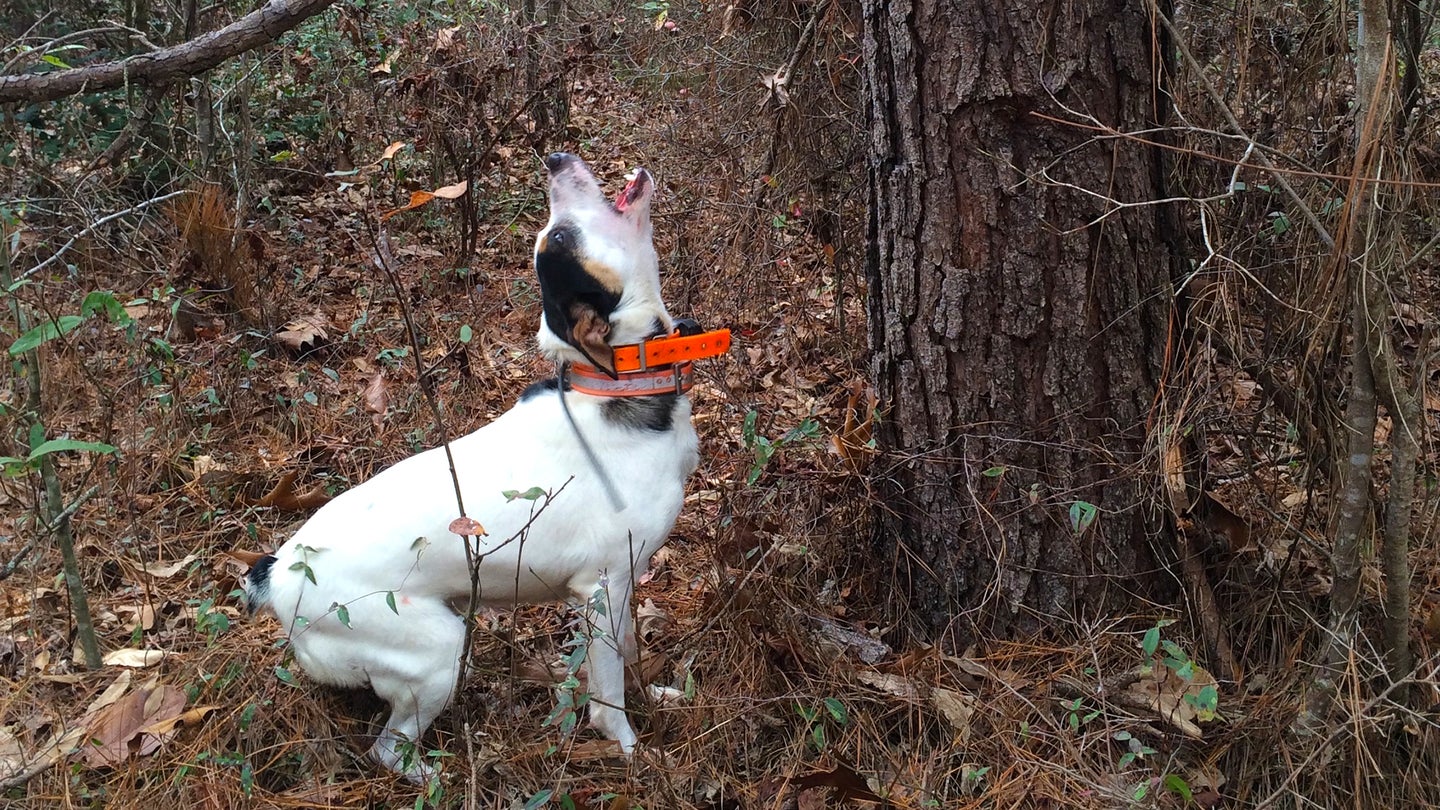Squirrel Hunting Dogs—And Why You Should Get One

A feist squirrel hunting dog barks at a treed bushytail. Shadowtail Kennels
Pound-for-pound, squirrel hunting dogs may be the most badass hunting dogs around. They’re tenacious, resourceful, and tireless, coving a surprising amount of ground for their size. Those who’ve hunted squirrels without dogs might be skeptical about hunting with one, but these dogs do have a place in the woods.
Squirrel hunting dogs really shine in the late season and on any day when it doesn’t seem like there is a squirrel in the woods. Best of all, keeping a dog for squirrel hunting is easier than feeding a pack of coon hounds or a big bird dog, as they’re small, typically weighing between 25 and 40 pounds. Still not convinced? Then let’s dive a little deeper. Here’s everything you should know about squirrel-hunting dogs, and don’t be surprised if it’s enough to change your mind.
What is a Squirrel Hunting Dog?
Squirrel hunting dogs fall into two main breeds: feists and curs. Both breeds will use their nose, eyes, and ears to track and find squirrels. They typically cast out to about 150 to 200 yards working a patch of hardwoods while a hunter follows behind. When they find a squirrel, these dogs will bay it into a tree so the hunter can get a shot. Squirrel dogs will also track wounded squirrels, dispatch them, and bring them to hand. Good squirrel dogs can track a squirrel as it jumps through the treetops and tries to escape.
What Makes Squirrel Hunting Dogs Different
A squirrel dog with not only tree bushytails but also chase them to your side of the tree to give you a good shot. Maciej Olszewski / Adobe Stock
Maybe you’ve watched your dog chase squirrels in the park and are thinking, What’s the big deal? Any dog can do that. But chasing squirrels is different than hunting them. Squirrels are, well, squirrely, and they run all over the place, leaving scent on logs, tree branches, and the forest floor before jumping from treetop to treetop.
Squirrels can give most dogs the slip, just as they do with their natural predators like coyotes and fishercats. But a squirrel hunting dog is like a detective, working methodically to unravel the twists and turns of scent a squirrel leaves behind. Squirrel hunting dogs also know how to work with hunters to get the drop on bushytails. They instinctively work opposite sides of trees to push squirrels to you, and they will use their eyes and ears to track a squirrel that’s moving through the trees.
Related: Squirrel Hunting 101: The Ultimate Guide to Chasing Bushytails
Feists vs. Curs
Feists are small, tenacious, and very effective squirrel dogs. Shadowtail Kennels
Feists and curs are the two most common types of squirrel hunting dogs, and they cover a broad array of more specific breeds geared toward squirrel hunting. They both come from the Southeast, where squirrel dogging is serious business. Feists are smaller than curs, weighing under 30 lbs and standing about 18 inches tall. They’re known for working closer than curs, and thanks to their terrier ancestry, they are quite tenacious. Squirrel hunters should consider the mountain fiest, Mullens fiest, Barger fiest, and American treeing fiest. Find a breeder, like Shadowtail Kennels, that specifically raises feists to hunt squirrels.
Curs are the larger of the two squirrel hunting dogs, weighing between 30 and 60 pounds and standing around 25 inches at the shoulder, though some are shorter than that. Because of their stature, they range farther than feists. Cur owners also feel their dogs have better noses. If you’re looking for a cur, work with a breeder like Lost Forty Kennels, and focus on breeds like the mountain cur, Stephens cur, Kemmer cur, and the treeing Tennessee brindle.
A pair of curs tree a squirrel. Curs are larger than feists. Lost Forty Kennels
How to Train a Squirrel Dog
If you’ve made it this far, you’re probably seriously considering a squirrel dog. You might have even already bought one and are wondering what to do with it. The best way to get your feist or cur in the woods is to start working with the dog as a pup. Once you’ve earned the dog’s trust, bring them with you everywhere—which is easy because squirrel dogs are small. You’ll want to expose them to the kinds of obstacles they’ll face in the woods, like creeks and blown-down logs. You’ll also want to work on basic obedience and reward them for things like coming to your call.
A good day of squirrel hunting with a feist. Shadowtail Kennels
While building up the pup’s strength and confidence, you should keep an eye out for roadkill squirrels and save a few pelts and hides from your hunts in the freezer. Use the hides to introduce your pup to squirrel scent, but don’t push him too hard at first if he doesn’t show interest. Reward him if he does, and let your pup play with hides and tails. As the dog progresses, hang the hides and tails just out of reach in trees and drag their scent on the trunks (not the ground). When your dog finds the hide or tail, encourage him to bark and reward him when he does.
Before hunting, you should make sure you’ve introduced your dog to gunfire and that he’s ok with it. You also want to focus on bringing your dog only to spots where you know there are a lot of squirrels at first. That way, he’ll have plenty of contact with wild game. On your dog’s first few successful trees, leash the dog to the tree so he knows he’s supposed to stay with the squirrel. If your dog doesn’t tree a squirrel, don’t shoot it. The squirrel is the reward for the dog. The best squirrel hunting dog trainers keep their dogs in the woods as much as possible. You shouldn’t get a squirrel dog unless you plan to do a lot of squirrel hunting. Above all else, be patient with your dog as he learns. If you’d like to learn more about training a squirrel hunting dog, check out Lost Forty Kennel’s squirrel-dog training tips.
The post Squirrel Hunting Dogs—And Why You Should Get One appeared first on Field & Stream.
Articles may contain affiliate links which enable us to share in the revenue of any purchases made.
